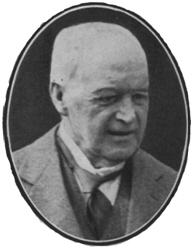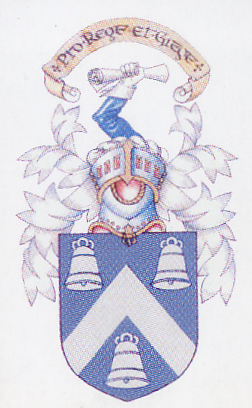|
Former Pupil Biographies
Lord Sands (1857 -1934)
The 'Old Boys Chronicle' in the
Madras College Magazine
for December 1904
reports:
"The 'Old Boys' of earlier and of later standing are everywhere giving a
good account of themselves. Even while it is impossible here to refer to
all who are eminent, the names of a few may now be set on record as
bringing every credit to their former school .... one of the most
successful contemporary Scottish law pleaders is Sheriff C. N. Johnston ..."
| Christopher Nicholson Johnston was born on 18 October
1857 in Kincardine, Perthshire to the minister of the parish of
Whithorn, Wigtownshire. He attended Madras College in St Andrews, then
St Andrews University, Edinburgh University and Heidelberg University.
In 1880, Johnston became an advocate and began a long career in the
law. From junior counsel in the government, he rose to Advocate-Deputy
in 1892. This post was a political one and so he spent a period out of
office alongside the Conservative Party. His second stint at the job
was between 1895 and 1899. From the turn of the century, Johnston
occupied various sheriffdoms across Scotland: Caithness, Orkney and
Zetland; Inverness, Elgin and Nairn; and, Perth in 1905. Three years
earlier, Johnston was made a judge. |
 |
Christopher Nicholson Johnston married Agnes in 1898
and together they produced two sons and two daughters. Alongside his legal
career, Johnston pursued that of a politician within the Conservative
Party. He contested Paisley in 1892 without success. In December of 1916,
he became MP for Edinburgh University and St Andrews University – now no
longer a sheriff. As Lord Sands (1917), Johnston became senator of the
college of justice in Scotland.
A third aspect of his life was the Church of Scotland. Amongst his roles
within that organisation were: procurator; legal advisor; and, member of
central committee. He was also a licensed lay preacher. As the official
legal advisor to the Church of Scotland, Johnston was responsible for the
negotiations that led to the unification of said church with the United
Free Church of Scotland. He wrote on church law and was considered eminent
in that field.
The final side of Johnston’s activity was involvement in education and
youth work. He was from 1921 the Chair of the Carnegie Trust for the
Scottish Universities and from 1919, president of the Boys’ Brigade.
Amongst his awards are included: Honorary Degree of DD (University of
Edinburgh – 1928); Honorary Degree of LLD (University of St Andrews –
1909); and Honorary Degree of LLD (University of Glasgow – 1930).
As a writer, he produced work on the law, biography, and theology and on a
wide field of culture.
He died at home in Edinburgh on 26 February 1934. He is buried in the
modern extension to Dean Cemetery off Queensferry Road in western
Edinburgh. The grave lies against the north wall in the modern equivalent
of Lord's Row in the original cemetery, forming one off a group of law
lords buried together. His wife Nancy Warren Dunn (1868-1955) lies with
him.
The 'Old Boys Chronicle' in the
Madras College Magazine
for Easter 1909
reports:
"Old Boys will he pleased to learn of the honour
which his Alma Mater has just conferred upon Sheriff Johnston. In
presenting the recipient, Professor Scott Lang made the following
reference:—Christopher Nicholas Johnston, King's Counsel, Sheriff of
Perthshire, Procurator of the Church of Scotland. Mr. Johnston is an old
Madras boy, and spent the first years of University life at the United
College; but family arrangements required that his Arts course should be
completed at the University of Edinburgh, about the same time as his
friends, the Rev. Patrick Playfair and Sheriff Armour (another old Madras
boy), were students there. And there, I may add, I had the not unpleasant
experience of revising their examination papers. Mr. Johnston, like all
St. Andrews students, has a warm heart to the city of the Northern Sea,
and cherishes his scarlet gown as one of his dourest possessions. At the
Bar, Mr. Johnston soon won his way to the first rank by his great
ability, his extensive and sound know ledge of law, his clear intellect,
and his unceasing energy. After a most successful career, he now holds,
following the steps of another brilliant student of St. Andrews, Lord
Ardwall, the office of Sheriff of Perthshire. Though always much sought
after as a counsel, Sheriff Johnston has contributed in no small measure
to the literature, of his profession, having published among other
volumes a revised and much enlarged edition of the standard work on
Scottish Ecclesiastical Parochial law. To Church Law Sheriff Johnston
has given special attention, and in it is recognised as an
authority of the first rank. A St. Andrews student like his
predecessors, Mr. Shanek Cook and Sir Charles Pearson, he holds the
position of chief legal adviser to the Church of Scotland. As a
layman, he has found scope for his pen and opportunity for valuable
service to the Church of his fathers in a handbook of Church
Defence,
and in various able and learned papers connected with the formula of
subscription to the Confession of Faith.
His latest work is a volume on the life of St. Paul and his
mission to the Ottoman Empire, in which, without entering into
doctrinal discussion or didactic exposition, he brings the story of
St. Paul into relation with the civil history of his time."
The 'Old Boys Chronicle' in the
Madras College Magazine
for June 1934
reports: In the death of Christopher N. .Johnston
(Lord Sands) we mourn the loss of another very old pupil of the Madras. He
was educated at the Madras and was one of the oldest members of the Madras
College Club. From the Madras he proceeded to St. Andrews University and
thence to Edinburgh University, where he graduated. In 1909 he received
the degree of LL.D. from St. Andrews University. But his connection with
St. Andrews did not end when he left, for he kept up an interest in our
affection for his old school, and four years ago he opened the Centenary
Fund Bazaar with a very racy speech full of stories of the old masters and
pupils of his day. Besides being one of Scotland's most prominent lawyers
and judges, Lord Sands took a keen interest in Church work, and the part
he took in the negotiations leading up to and the carrying through of the
Union between the Church of Scotland and the United Free Church in 1929
is difficult to estimate.
In 'The Madras College' Dr Thompson wrote:
"Christopher Johnston, the future Lord Sands, followed a
normal course of legal study to become sheriff of Perthshire, and later,
after a few years as a member of Parliament, a senator of the College of
Justice. His work as procurator of the General Assembly of the Church of
Scotland, particularly in the negotiations leading to the union of the
Church of Scotland and the United Free Church gave him the unusual
distinction for a layman of a doctorate in divinity."
|

